牛津版初二上册英语4-6单元语法点及习题.
沪教牛津版八年级上册英语教材
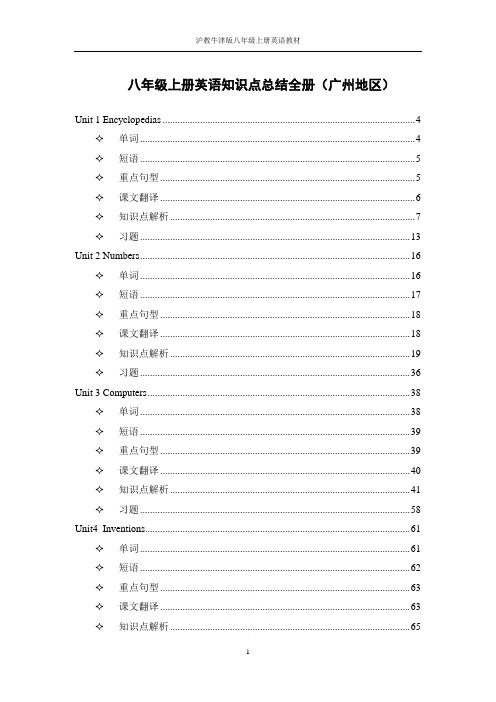
八年级上册英语知识点总结全册(广州地区)Unit 1 Encyclopedias (4)✧单词 (4)✧短语 (5)✧重点句型 (5)✧课文翻译 (6)✧知识点解析 (7)✧习题 (13)Unit 2 Numbers (16)✧单词 (16)✧短语 (17)✧重点句型 (18)✧课文翻译 (18)✧知识点解析 (19)✧习题 (36)Unit 3 Computers (38)✧单词 (38)✧短语 (39)✧重点句型 (39)✧课文翻译 (40)✧知识点解析 (41)✧习题 (58)Unit4 Inventions (61)✧单词 (61)✧短语 (62)✧重点句型 (63)✧课文翻译 (63)✧知识点解析 (65)✧习题 (68)Unit5 Educational exchange (71)✧单词 (71)✧短语 (72)✧重点句型 (72)✧课文翻译 (73)✧知识点解析 (74)✧习题 (83)Unit 6 Ancient stories (85)✧单词 (85)✧短语 (87)✧重点句型 (87)✧课文翻译 (88)✧知识点解析 (89)✧习题 (95)Unit 7 Memory (100)✧单词 (100)✧短语 (101)✧重点句型 (101)✧课文翻译 (102)✧知识点解析 (103)✧习题 (109)Unit 8 English Week (114)✧单词 (114)✧短语 (115)✧重点句型 (115)✧课文翻译 (116)✧知识点解析 (117)✧习题 (122)每单元必考语法点预览Unit 1 some与any的用法& 复合不定代词somebody, anybody, nobody等的用法Unit 2基数词及数字的表达& 序数词Unit 3形容词的比较级与最高级Unit 4 good, bad, far & (not) as…as…Unit 5现在完成时& already, yet, ever, neverUnit 6 现在完成时中since, for & 现在完成时与一般过去时的区别Unit 7(真实性)条件状语从句& if…not 与unlessUnit 8情态动词should, had betterUnit 1 Encyclopedias 单词suddenly adv. [ˈsʌdn:lɪ] 意外地,忽然地nobody pron. [ˈnoˌ bədi] 没有人,无人fossil n. [ˈfɑsəl] 化石win v [wɪn] 获胜,赢dollar n [ˈdɑlɚ] 美元✧短语1.in the countryside 在乡村,在农村11.for example 例如2.human being 人12.next to 紧挨着3.die out 灭绝,消失13.look up 查阅4.find out 了解,弄清14.live on Earth 生活在地球上5.go for a walk 去散步15.an Italian painter 一位意大利画家6.be born 出生ed to do sth 过去常常做某事7.more than 多于,超过17.at the end of 在…末尾8.just like 正如,正像18.in the centre 在中心9.how long 多久e out of…从…出来10.would like 想要20.be famous for 以…而闻名✧重点句型1.Some dinosaurs were as small as chickens. 有的恐龙和鸡一样小。
最全面牛津版八年级上册英语各单元知识点总复习归纳总结

最全面牛津版八年级上册英语各单元知识点总复习归纳总结1. Unit 1: Greetings and Introductions- Present simple tense- Questions with "what" and "where"2. Unit 2: School Life- Describing school subjects- Using adjectives to describe teachers and classmates- Asking and answering questions about school routines3. Unit 3: Hobbies- Vocabulary related to hobbies and interests- Expressing likes and dislikes- Present continuous tense4. Unit 4: Food and Health- Food vocabulary and describing preferences- Expressing opinions on healthy eating habits- Imperative sentences for giving suggestions and instructions5. Unit 5: Holidays and Traditions- Vocabulary related to holidays and celebrations- Describing past events- Using time expressions and prepositions to talk about when and where6. Unit 6: Environment- Vocabulary related to environmental issues- Expressing concerns and suggestions for protecting the environment- Present perfect tense to talk about experiences7. Unit 7: Jobs and Career Choices- Vocabulary related to different professions- Talking about future plans and aspirations- Using "will" and "going to" for future predictions and intentions- Expressing opinions on advantages and disadvantages of technology- Present perfect continuous tense这份文档总结了八年级上册牛津版英语教材各单元的知识点。
牛津译林版八年级上册 知识点+同步练习(带答案)
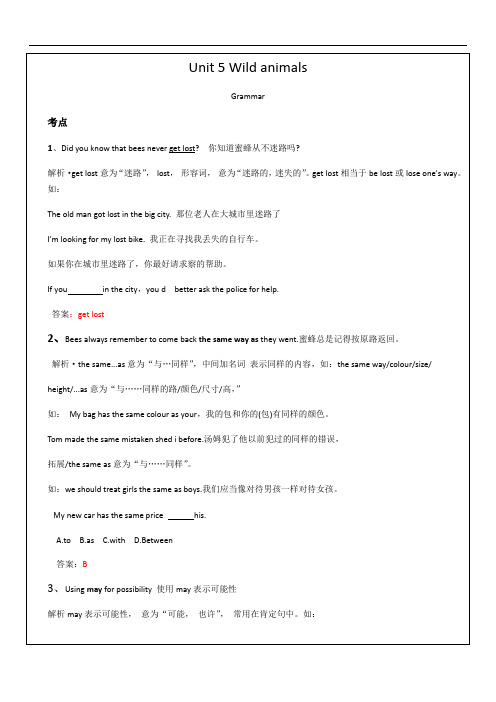
8.(not go) near the tigers!They may hurt you.o15daoM To
9.Would you please(protect) our forests by doing little things?
He doesn't know what to do next.他不知道下一步做什么。
1 .-Do you have any places for the coming vacation? Sure.We decideFrance in July.
A.visit B.visiting C.visited D.to visit
10.At the(begin) of the concert,Tan Dun played a piece of music with water.
三、单项选择。
( ) 1.一Daniel,do you know that bees never get lost?
一Yes.Bees always rememberthe same way as they went.
4.This book is much(厚) than that one.I'll take that one.
5.The(失去) of living areas makes tigers have nowhere to live.
6.People sometimes(猎杀) tigers for their fur.
No,you mustn't.不,你不可以。
1.一Will Anna go to the movies with us tonight?-Shego,but I'm not sure.
牛津英语八年级上8A4—6单元重点短语和句型回顾
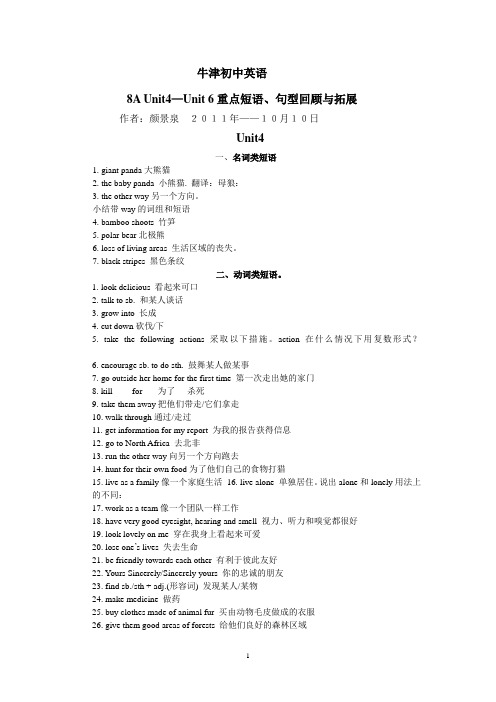
牛津初中英语8A Unit4—Unit 6重点短语、句型回顾与拓展作者:颜景泉2011年——10月10日Unit4一、名词类短语1. giant panda大熊猫2. the baby panda 小熊猫. 翻译:母狼:____________3. the other way另一个方向。
小结带way的词组和短语___________________________________________4. bamboo shoots 竹笋5. polar bear北极熊6. loss of living areas 生活区域的丧失。
7. black stripes 黑色条纹二、动词类短语。
1. look delic ious 看起来可口2. talk to sb. 和某人谈话3. grow into 长成4. cut down砍伐/下5. take the following actions 采取以下措施。
action在什么情况下用复数形式?_________________________________________________6. encourage sb. to do sth. 鼓舞某人做某事7. go outside her home for the first time 第一次走出她的家门8. kill --- for --- 为了----杀死----9. take them away把他们带走/它们拿走10. walk through通过/走过11. get information for my report 为我的报告获得信息12. go to North Africa 去北非13. run the other way向另一个方向跑去14. hunt for their own food为了他们自己的食物打猎15. live as a family像一个家庭生活16. live alone 单独居住。
牛津译林版八年级英语上册Unit 4全章知识点练习汇总
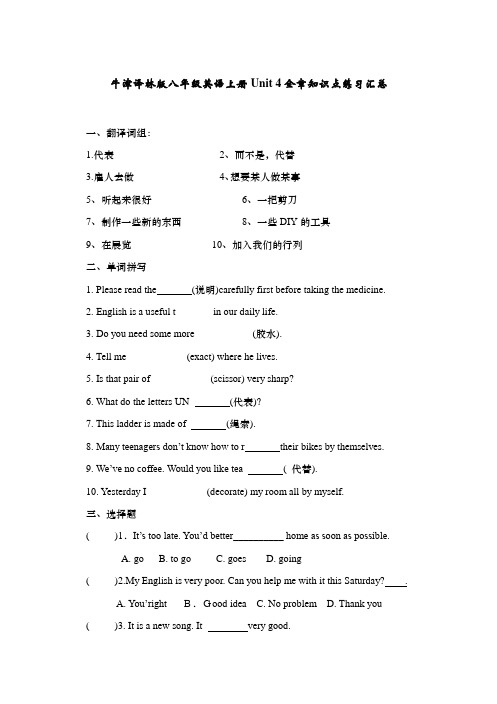
牛津译林版八年级英语上册Unit 4全章知识点练习汇总一、翻译词组:1.代表_____________________2、而不是,代替_______________________ 3.雇人去做_____________ 4、想要某人做某事______________________ 5、听起来很好________________ 6、一把剪刀______________________ 7、制作一些新的东西__________ 8、一些DIY的工具______________9、在展览________________10、加入我们的行列___________________二、单词拼写1. Please read the (说明)carefully first before taking the medicine.2. English is a useful t _______in our daily life.3. Do you need some more___________ (胶水).4. Tell me____________(exact) where he lives.5. Is that pair of____________(scissor) very sharp?6. What do the letters UN (代表)?7. This ladder is made of (绳索).8. Many teenagers don’t know how to r their bikes by themselves.9. We’ve no coffee. Would you like tea ( 代替).10. Yesterday I____________(decorate) my room all by myself.三、选择题( )1.It’s too late. You’d better__________ home as soon as possible.A. goB. to goC. goesD. going( )2.My English is very poor. Can you help me with it this Saturday? .A. You’right B.Good idea C. No problem D. Thank you ( )3. It is a new song. It very good.A. soundsB. tastesC. looksD. turns( ) 4. We would like to go to the cinema watching TV at home.A. because ofB. pay attention toC. instead ofD. look after.( ) 5. Danny, come here. I have to tell you.A. something newB. new somethingC. anything newD. new anything. ( )6.There _________ a pair of scissors and two pairs of shoes on the f loor.A.isB.areC. haveD. has( )7.Can you show _______ how ____________ paper roses?A. I, makeB.me ,makin gC.me, to makeD. I ,to make ( )8.-- Liu Tao plays ____ computer games at weekends. --Yes, he plays ___.A. too many, too muchB.too much, too manyC. too many, too manyD.too much, too much ( )9.--Must I hand in my homework now?---Yes, you _______.A. needB. mustC. mayD.can三、用所给词的适当形式填空1.Read the _________________(说明,指示) first before you use the computer.2. Please pass me the __________ (胶水)and ______________(剪刀).3. I ___________(确切地) know how she feels now, she is very sad.4. The chair is broken, but I can r_________ it with some___________(工具).5. He is an artist, he has many b____________.6. This idea sounds__________ (love).Why not _________(try) it?7. A pair of scissors _________( not , be) enough for us.8. You look tired. You’d better __________ (stop ) __________ (have) a rest.9.What’s the ______(mean) of the word? =What does the word ______(mean)?10.Both of _________ (they) have lunch at school.11.Good _______(luck) to you! I am _______(luck) to pass the difficult exam.12. The long talk made me __________(bore).13.Many foreign friends are very _____ in__________places in China.(interest)14.We can’t be the______(win) without the ___________support.(support)15.We don’t want these red pencils .I want those green ____________(one).三、翻译句子1.你最好不要和狗玩。
牛津译林版八年级上册全册语法知识点复习总结

牛津译林版八年级上册全册语法知识点复习总结一、形容词的比较级和最高级1. 形容词的比较级用于两个人或事物之间的比较,其结构如下:主语+谓语动词(系动词)+形容词比较级+than+比较对象。
2. 形容词最高级的由用法:形容词最高级用于三者或三者以上的人或物进行比较,其结构为:主语+谓语动词(系动词)+the+形容词最高级+名词+表示范围的短语或从句。
3. 形容词的比较级和最高级是在形容词原级的基础上变化的,分为规则变化和不规则变化。
①规则变化①不规则变化二、比较事物的数量1. 两者之间比较通常用more..than/ less... than 和fewer..than来比较两种事物之间的数量关系。
其中more... than之间加可数名间的复数形式或者不可数名词,less... than 之间加不可数名词,fewer...than 之间加可数名词的复数形式。
例:I has more apples than Lily.我的苹果比莉莉的多。
He eats less food than I for breakfast.他早饭比我吃得少。
Bobby has fewer books than Tim.波比的书比蒂姆的少。
2. 三者或三者以上比较通常用the most、the least、the fewest 来比较三者或三者以上事物之间的数量关系。
the most、the fewest、the least 分别是many/much、few、little 的最高级。
the most 表示“最…;最多”,其后既可接可数名词又可接不可数名词;the fewest 表示“最少”,其后接可数名词的复数形式;the least 表示“最少”,其后接不可数名词。
例:Jack gets the most points of the three boys.在三个男孩中,杰克的得分是最高的。
He has the least milk among them. 他的牛奶是他们之中最少的。
8上Unit4语法讲解与练习

新版牛津版 8上 Unit 4 语法知识点讲解与练习一、本单元课本知识点1、clear instructions清晰的说明clear: a. 形容词,“清晰的,明亮的”,副词形式为clearly;b. 动词,“扫除,出去”,词组为clear up, clear way, “清理,打扫”2、had better do sth. 最好做某事Had不能改为have或has, 对上级或长辈不宜用此结构3、No problem. 没问题A.用于回答感谢B. 用于回答道歉C.表示同意或愉快地回答请求D. 表示有能力做某事,意为“没问题,不在话下”4、stand for 代表,象征stand的词组:stand up站立,经得起,抵抗stand in 代替,顶替stand out突出,出色stand by支持,袖手旁观,做好准备stand back 往后退,置身事外5、decorate 动词,修饰,装饰。
名词形式decoration. 常见词组decorate…with 用…装饰6、instead与instead ofa.instead 意为代替,替代,作副词用,通常位于句尾。
如位于句首,常用逗号与后面隔开。
eg: Lily isn’t here. Ask Lucy instead.b.Instead of是介宾短语,后面一般跟名词、代词、介词、短语、动词-ing形式。
eg: I’ll go instead of her.7、be crazy about 热衷于,迷恋上be crazy for渴望,迷恋上drive someone crazy 使某人发狂8、put in与put intoa. put in 意为“安装,添上,插话”eg: Can I put in a word? 我能插话吗b. put into “将…注入” eg: He put as much feeling into his voice as he could.9、keep doing与keep on doing: 两者均可表示“继续做某事,反复做某事”,但是keep on更强调时间的间隔性和动作的反复性,及某人做某事的决心。
沪教牛津版初二上册英语知识点总结全册含习题和答案
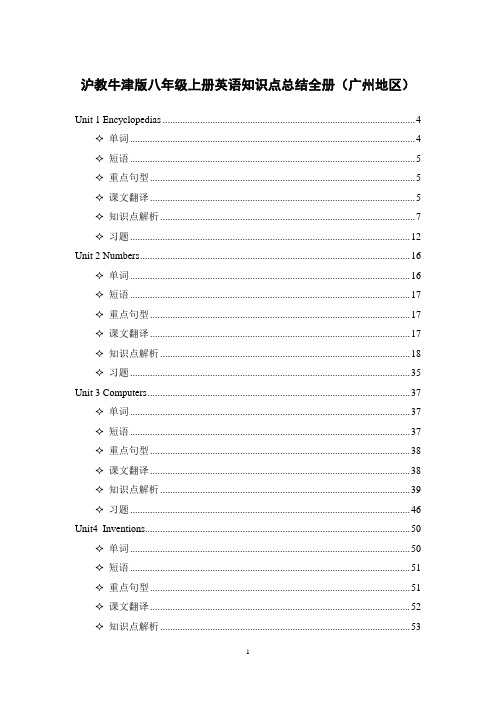
沪教牛津版八年级上册英语知识点总结全册(广州地区)Unit 1 Encyclopedias (4)✧ 单词 (4)✧ 短语 (5)✧ 重点句型 (5)✧ 课文翻译 (5)✧ 知识点解析 (7)✧ 习题 (12)Unit 2 Numbers (16)✧ 单词 (16)✧ 短语 (17)✧ 重点句型 (17)✧ 课文翻译 (17)✧ 知识点解析 (18)✧ 习题 (35)Unit 3 Computers (37)✧ 单词 (37)✧ 短语 (37)✧ 重点句型 (38)✧ 课文翻译 (38)✧ 知识点解析 (39)✧ 习题 (46)Unit4 Inventions (50)✧ 单词 (50)✧ 短语 (51)✧ 重点句型 (51)✧ 课文翻译 (52)✧ 知识点解析 (53)✧ 习题 (56)Unit5 Educational exchange (59)✧ 单词 (59)✧ 短语 (59)✧ 重点句型 (60)✧ 课文翻译 (61)✧ 知识点解析 (62)✧ 习题 (70)Unit 6 Ancient stories (73)✧ 单词 (73)✧ 短语 (74)✧ 重点句型 (74)✧ 课文翻译 (75)✧ 知识点解析 (76)✧ 习题 (81)Unit 7 Memory (86)✧ 单词 (86)✧ 短语 (87)✧ 重点句型 (88)✧ 课文翻译 (88)✧ 知识点解析 (89)✧ 习题 (96)Unit 8 English Week (100)✧ 单词 (100)✧ 短语 (101)✧ 重点句型 (101)✧ 课文翻译 (101)✧ 知识点解析 (103)✧ 习题 (107)每单元必考语法点预览Unit 1 some与any的用法& 复合不定代词somebody, anybody, nobody等的用法Unit 2基数词及数字的表达& 序数词Unit 3形容词的比较级与最高级Unit 4 good, bad, far & (not) as…as…Unit 5现在完成时& already, yet, ever, neverUnit 6 现在完成时中since, for & 现在完成时与一般过去时的区别Unit 7(真实性)条件状语从句& if…not 与unlessUnit 8情态动词should, had betterUnit 1 Encyclopedias 单词✧短语1.in the countryside 在乡村,在农村11.for example 例如2.human being 人12.next to 紧挨着3.die out 灭绝,消失13.look up 查阅4.find out 了解,弄清14.live on Earth 生活在地球上5.go for a walk 去散步15.an Italian painter 一位意大利画家6.be born 出生ed to do sth 过去常常做某事7.more than 多于,超过17.at the end of 在…末尾8.just like 正如,正像18.in the centre 在中心9.how long 多久e out of…从…出来10.would like 想要20.be famous for 以…而闻名✧重点句型1.Some dinosaurs were as small as chickens. 有的恐龙和鸡一样小。
- 1、下载文档前请自行甄别文档内容的完整性,平台不提供额外的编辑、内容补充、找答案等附加服务。
- 2、"仅部分预览"的文档,不可在线预览部分如存在完整性等问题,可反馈申请退款(可完整预览的文档不适用该条件!)。
- 3、如文档侵犯您的权益,请联系客服反馈,我们会尽快为您处理(人工客服工作时间:9:00-18:30)。
Unit 4(1)good,bad,far比较级和最高级(2) ( not) as…as的用法(not) as…as意思是“和……(不)一样……”,表示人或事物在某个方面程度(不)相当。
常见于以下结构中:1. (not) as+形容词原级+as…This advertisement is as funny as that one.逮个广告和那个一样有趣。
My mobile phone is not as expensive as yours.我的手机没有你的那么贵。
2 .(not) as many+可数名词复数+as…( not) as much+不可数名词+as…I have as many notebooks as my brother.我的笔记本跟哥哥的一样多。
注意:在否定句中,第一个as也可换成so,即not so…as….。
如:This new sofa is not so comfortable as the old one.这个新沙发不如旧的那个舒服。
Unit 51、现在完成时:主要强调过去发生的动作对现在造成的影响,或过去发生的动作还未结束,一直持续到现在或将来,重点在于对现在的影响。
这种考查难度较大,往往无时间状语,需要从上下文分析、推理才行。
(1)意义:①表示过去发生的动作对现在造成的影响或结果She has been ill for three days. (她病了三天了。
)②表示从过去某一时间开始一直持续到现在的动作或状态。
We've known each other since we were children. (我们从小就认识。
)I have been a member of the Party for 10 years.③常与现在完成时连用的时间状语有:just刚刚 yet 仍然,还 now 现在 lately 最后ever 曾经 today 今天 never 从未 before 从前recently 最近 already 已经 this week 本周 since 自从for a long tine 很长时间了 since then 自那以来so far 到目前为止 in the past/last few years 在过去/最近的几年(2)构成:”助动词have, has + 过去分词”【随堂练习】把下面变否定句、一般疑问句并作肯定和否定回答。
1. I have done my homework.否定句:_______________________________________一般疑问句:___________________________________回答:_________________________________________2. The plane has arrived.否定句:_______________________________________一般疑问句:___________________________________回答:_________________________________________2、动词的过去分词构成规则(1)规则变化①大部分动词在词尾直接加-ed: clean-- cleaned help-- helped②以不发音的e结尾的,直接加-d: like--liked live--lived③以辅音字母+y结尾的单词,变y为i再加edtry --tried study-- studied④重读闭音节词尾只有一个辅音字母的,需要双写最后这个辅音字母再加-ed.plan-- planned stop-- stopped(2)不规则变化: see--seen find--found【随堂练习】写出下列单词的过去分词形式work _________ finish __________ arrive___________change_________ see___________ have___________marry__________ visit__________ miss___________prefer__________ do___________ hear____________live____________ clean________ study___________meet___________ be __________ climb___________plan____________ take_________ stop____________keep____________ buy_________ spend____________learn___________ forget__________ bring____________3、现在完成时用法归纳(1) 现在完成时表示过去发生的动作现已完成,对现在造成的影响和结果。
(此种用法谓语动词用结束性动词)如:The plane has arrived.常用的时间状语和副词:already ,yet , ever , never①already 已经;yet 尚未,仍未,还;强调前不久完成的动作对现在造成的影响,谓语动词使用非延续性动词。
already 用于肯定句中,yet 用于否定句和疑问句的句末。
例如:I have already finished my homework. 我已经完成我的家庭作业了。
He hasn’t come yet.他还没有回来。
Has she finished cooking yet? 他做完饭了吗?练:I have already done my homework. (变为否定句)______________________________________________②ever (曾经),句中;never (从不),表示否定,强调到目前为止的生活经历。
谓语动词用延续性动词。
例如:Have you ever climb that mountain? 你曾经爬过那座山吗?Have you ever been to Shanghai?你曾经去过上海吗?I have never late for school.我从来没有迟到过。
③already ever与never应位于助动词have/has 之后,主要动词之前。
拓展:before (以前),句尾,独立用I haven’t met him before. 我以前从来没有见过他。
just (刚刚),用于肯定句中,常用在助动词和过去分词之间。
如:I have just heard the news. 我刚刚听到消息。
【跟踪训练】()1. Have you ______ heard of Disneyland?A. alwaysB. everC. neverD. sometimes()2. I have ________ finished my homework. So I can have a rest now.A. everB. alreadyC. neverD. yet()3. She is a good student, she has _______ been late for school.A. everB. alreadyC. neverD. yet()4. I am very hungry , I haven’t had my breakfast________.A. everB. alreadyC. neverD. yet4、at the weekend意为“在周末”,也可以说成at weekends.One of his very close friends visited him at the weekend.We will have a game of tennis at weekends.“在平时; 在工作日(周一至周五)”的说法是on weekdays.5、a bit of= a little “少量”, 后可接不可数名词。
I need a bit of time to think about it. There’s only a little bread left.a bit= a little “有点儿”,修饰形容词或副词。
It’s a bit (a little) cold today. You’d better put on your coat.6、one another “相互;互相” =each otherWe respect each other/one another.The sea and the sky seemed to melt into one another/each other.大海和蓝天似乎融为一体。
▲这两个短语均有所有格。
They know each other's/one another's weak points. 他们都了解彼此的缺点。
▲each other和one another是代词,在及物动词之后可直接用作宾语(如help eachother);而在不及物动词之后,则要借助介词(talk to each other, learn from one another等)。
另外,需注意这两个短语均不能用作主语。
7、come over to是come to的变化形式,强调有一定的距离,意为“从……到……”When did you first come over to the UK?Unit 61、现在完成时Since 和for 的用法表示过去已经开始持续到现在的动作或状态常用的时间状语有:for, since, how long, so far, these days等。
Since+过去点的时间,for+一段时间(数词+量词),一般用how long提问。
since短语或从句表示过去的动作延续至今,since之后的时间为一点。
如:for短语表示动作延续多长时间,for的宾语为时间段。
练习:用since和for填空1) ______ two years 2) _______ two years ago 3) _______ last month4) ______ 1999 5) _______ yesterday 6) _______ 4 o’clock7) ______ 4 hours 8) _______ an hour ago 9) _______ we were children10) _____ lunch time 11) ______ she left here2、现在完成时和一般过去时的区别现在完成时和一般过去时都表示在过去完成的动作。
